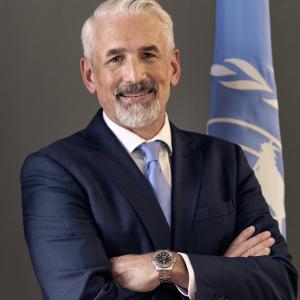Hon’ble Minister Mr. Aditya Thackrey
Ms. Manisha Patankar Mhaiskar
Ms Dia Mirza UNEP Goodwill Ambassador,
Mr Afroz Shah, UNEP Champion of the Earth,
Karnav, our young Tide Turners Champion,
My colleagues Ms Sheila Agarwal Khan, Ms Dechen Tsering, and Mr Atul Bagai
Ladies and Gentlemen,
· I am pleased to join you today to commemorate this important partnership, and I want to begin by expressing my appreciation to you, Minister Thackeray, and to the Government of Maharashtra, for your incredible Republic Day biodiversity float! I had the privilege to attend the parade in New Delhi last week and was struck not only by India’s vibrant diversity, but by the commitment to sustainability and ecosystems signalled by tableaux like yours.
· The signing of this MOU, in many ways, signifies the future of global climate action: the leadership of subnational governments, federal states, and cities.
· This is not just the way the United Nations sees it. Minister Thackeray has also said in Glasgow earlier this year, during COP 26, that there is an urgent need for states and subnational governments to act on climate change. States are not only responsible for the implementation of policies and programmes on the ground, but they are also the first line of defence against environmental and climatic events and disasters.
· In the past two years, we have seen these risks up close. COVID 19 was not the only challenge that uncovered our vulnerabilities. As we stood less than a decade from irreversible temperature rises and the target date for our Sustainable Development Goals, India confronted the challenges of cyclones, flash floods, and dangerous levels of air pollution.
· But equally in India, we all saw those ambitious commitments that have the potential to course correct for the world – the Honourable Prime Minister at COP 26 committing India to net zero and further upping renewable energy ambitions to 500 GW.
· And in Maharashtra, standard setting policy initiatives green curriculums, developed with the support of the UN1, the Environmentally Balanced Prosperous Village Development Scheme, a new Electric Vehicle Policy, and the very first Wildlife Action Plan.
· I also want to congratulate the Government of Maharashtra, for receiving the Regional Leadership Award from the Under 2 Coalition during COP 26 recently, and I am also pleased to learn that the state has joined the UN Race to Zero Initiative and joined the C40 Cities initiative – two important global commitments.
· The United Nations in India is pleased today to partner with Maharashtra, a state with which we enjoy a strong relationship through our work on the SDGs, poverty, waste management, sustainable agriculture, gender equality, nutrition, livelihoods, value chains, and the programme of work of many of our UN agencies, including UNDP, UNICEF, and UNFPA who have field offices in the state.
· The MoU UNEP is signing with the Government of Maharashtra today is comprehensive and goes to the heart of the tangible actions that are needed to nurture a green and vibrant Maharashtra that has lessons for the rest of the world. Some of the issues it looks at are:
o Pollution and use of natural resources
o Environmental education strategy
o Training and mobilizing young people on plastic pollution and marine litter.
o Engaging industry and other stakeholders on reduction and circularity in plastics.
o Clean energy initiatives including nature-based solutions, energy conservation, cooling, and extreme heat interventions.
o A Climate Change Summit which is being planned by Maharashtra.
o And a flagship initiative on ecosystem restoration for the UN Decade of Ecosystem Restoration at city and state levels.
· Today we are confronted not only by the global shock of this pandemic, but a looming triple planetary crisis of climate, nature, and pollution. We are embarking on a national and global project to build back better, cognizant of the deep links between unsustainable consumption and production patterns and the deep socio-economic inequalities threatening our collective future.
· As we enter the Decade of Action for the SDGs, we are acutely conscious of the fact that the success of the global 2030 Agenda will depend on India’s sustainable development trajectory over the next 5-7 years. I am confident that Maharashtra’s model will be one of those examples that we take to the world in its fight against catastrophic risk.
· I want to reassure you, on behalf of the UN Country Team in India, of our strong support in this journey.




